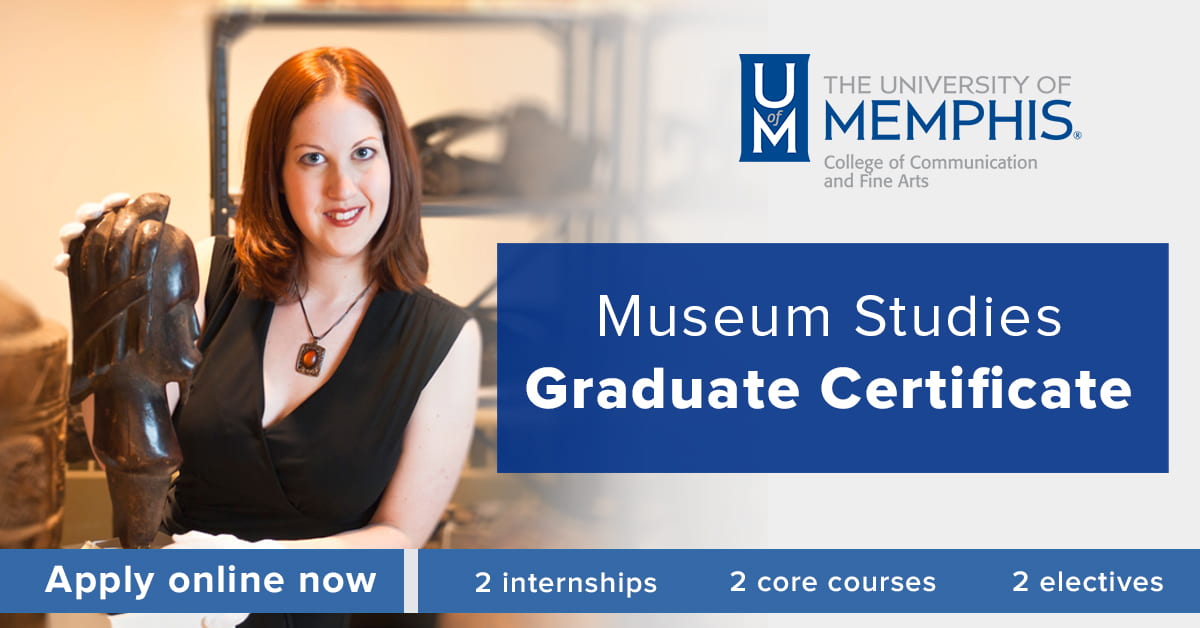The Interdisciplinary Graduate Certificate Program in Museum Studies is now available to anyone, anywhere, as the program shifts to an entirely online format this fall through UM Global.
A Graduate Certificate in Museum Studies prepares students who are currently enrolled in or hold advanced degrees to enter the museum professions. The program is administered jointly by the College of Communication and Fine Arts and the College of Arts and Sciences. The course of study is tailored to each student’s career objectives in consultation with the program coordinator, Dr. Leslie Luebbers, Director of the Art Museum of the University of Memphis (AMUM).
The 18-hour program is comprised of six courses:
- Two core courses:
- Museum Practices, which focuses on governance, internal operations and strategic planning
- Museums and Communities, which focuses on a museum’s relations with its constituencies
- Two internships at museums of the student’s choice
- Two elective courses that advance the student’s goals selected from UM Global’s graduate catalog.
The interdisciplinary program welcomes individuals from all fields, including art, anthropology, archaeology, art history, biology, design, history, business, education, geology, graphic design, media studies, communication, and public administration. The program prepares students for museum administration, education, collection management, registration, curation, and public program development. In addition, students become acquainted with best practices and ethics as defined by national and international museums associations and learn about the changing role of the museum in the cultural landscape.
These changes are vast and sometimes urgent. In academia, issues of power and representation dominate discourse in many disciplines. However, for museums these are often the stuff of frontpage news and editorial scolding or praise. Whose money is sanitized? Whose names are chiseled above portals? Whose stories are told and not told? Whose interests are advanced or suppressed? Museum studies students closely follow, examine and discuss these issues and how museums are responding to criticism and demands for sharing power, responsibly representing and participating in their communities.
Traditionally, museums have collected, cared for, interpreted and exhibited objects of cultural importance across a wide spectrum of disciplines from anthropology to zoology (Yes, zoos are museums). They still do.
“But increasingly,” says Dr. Luebbers, “museums also use their assets—collections, knowledge, skills and spaces—to promote positive community changes. AMUM, for example, has collaborated with groups devoted to social justice, youth leadership, disability services, climate activism, immigrant services and neighborhood development.” Science and natural history museums work with schools to foster STEM learning and career development and with climate activists to advance environmental responsibility, equity and biodiversity. Local history museums and historic houses research the untold stories of workers, slaves, and immigrants and advance learning of traditional, sustainable practices and crafts. Zoos, no longer merely collections of exotic creatures, are now leaders in the preservation of the world’s threatened species.
Museum careers offer exciting, creative opportunities for scholarship, education, public service, and social entrepreneurship.
For more information on the Interdisciplinary Graduate Certificate, and how to apply visit memphis.edu/museumstudies

Be First to Comment